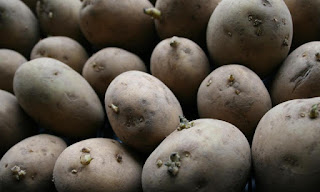Blueberries
General Blueberry Growing Tips
For the best chance at success with blueberries buy a plant that is at least 2 years old. Since they don't begin to fruit for at least three years, this will also save time and provide you with a blueberry crop much sooner. Blueberry bushes are extremely fussy about the soil they're planted in. If your soil isn't quite up to snuff, there are a couple of ways to remedy this situation.
·pH Levels -
The optimum pH level to grow blueberries in is 4.5. If your soil is higher than that, you'll want to add ammonium sulphate to lower the pH level. Follow the directions on the product packaging to calculate the amount needed for your growing space, and work the sulphate into the soil at least 6" deep. (Ericaceous compost can be an easier option by incorporating into the soil before you plant your blueberries.)
·Alternatively keep the young plant in pots, well drained, for the first few years which will control the ph of the soil and then plant out, again, using ericaceous compost well mixed in the compost / soil)
This is Blueberry Goldtraube - which is one of the varieties we selected.
Some other things to consider when growing blueberries are:
- Sunshine - Blueberries thrive best in full sunlight.
- Watering - A consistent supply of water is best for blueberries, with optimal levels of 2" per week of water. Choose a well-drained soil to avoid water pooling at the base of the plant.
- Fertilisers and Compost - Continue adding compost or organic matter as needed. You can add ammonium sulphate fertiliser in very small amounts once or twice during the growing season. (Follow instructions on the packaging)
- Mulch - A thick layer of mulch will help deter weeds and hold moisture for your blueberry bushes. Add more as required to keep mulch at a depth of about 4".
- Pruning - You won't have to prune your blueberry bush at all for the first four years of its life. After that, remove any dead branches or stalks, and trim back any shoots that are very tall. When branches are overloaded with fruiting buds, the resulting berries can be small and bitter. To avoid this, prune the shoots so that they don't have more than five or six buds each. As the bushes spread and grow, you can thin them out and replant the newer shoots.








